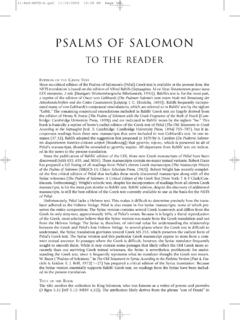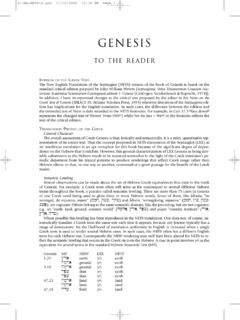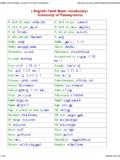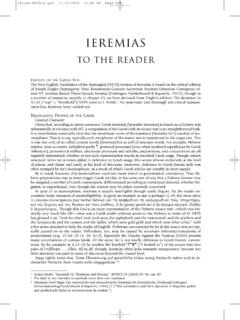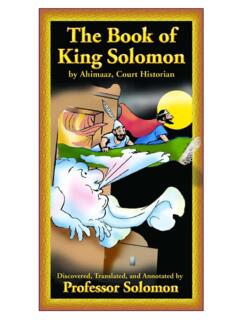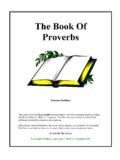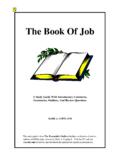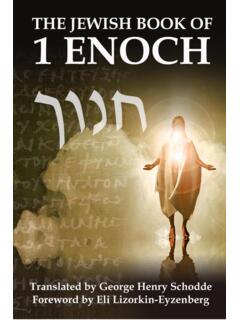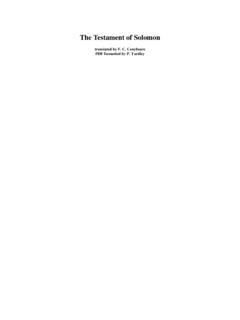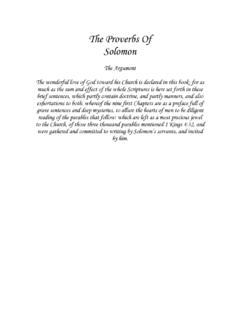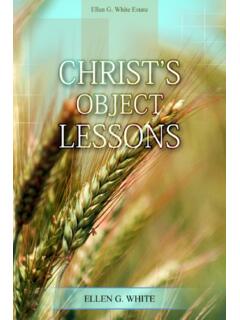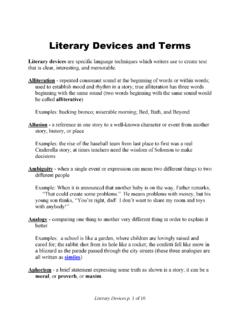Transcription of WISDOM OF SALOMON - University of Pennsylvania
1 EDITION OF THEGREEKTEXTThe NETS translation of the WISDOM of SALOMON (WisSal) is based on the edition of Joseph Ziegler,Sapientia Salomonis(Septuaginta: Vetus Testamentum Graecum Auctoritate Academiae Scientiarum Gottingen-sis editum , 2[G ttingen: Vandenhoeck & Ruprecht, 1962 (durchgesehene Auflage, 1962)]). Thisfully-fledged critical edition is based primarily on the evidence of the major Greek witnesses, Codex Vat-icanus (B) and Codex Sinaiticus (S), which Ziegler believed to be related, and Codex Alexandrinus (A),but it also draws on the evidence of all the other Greek witnesses and of the versions, particularly the OldLatin. This (the Old Latin) dates from the second half of the second century and is of particular impor-tance because it is based on Greek manuscripts earlier than any still extant. In addition to Ziegler s edi-tion, I have consulted the manual edition of the Septuagint edited by Alfred Rahlfs (Septuaginta.)
2 Id estVetus Testamentum graece iuxta LXX interpretes, 2 vols.[Stuttgart: W rttembergische Bibelanstalt, 1935]),which was used as the basis of the NRSV of the WISDOM of SALOMON (Solomon).I have diverged from the critical text established by Ziegler in only six cases. In two of these, Ziegleradopted into his text readings based on the evidence of the Old Latin: in I read h9mw~n, which is at-tested by most of the Greek witnesses, and not leimw&n(=pratumof the Old Latin), and in I readth\n o0rgh/n, attested by all the Greek witnesses, and not th\no9rmh/n(= Old Latinimpetum). In I fol-low an old conjecture and read fona/jin place of fone/aj. In I read qnhto/jwith B*-S, not qnhto\ja1nqrwpoj, and in I read oi9 katadunasteu/santej, which is attested by many Greek manuscriptsand seems to be required by the sense, not katadunasteu/santej.
3 Finally, in I read a0nq w{nwith Sand other Greek witnesses, not w{n. In all six cases the reading I have adopted corresponds to that fol-lowed by the OF THEGREEKT here is widespread recognition that the WisSal was composed in Greek, and the few suggestions thathave been made for composition in Hebrew or Aramaic and for translation into Greek have found littlesupport. The book is an example of a protreptic work (protreptiko\j lo/goj), an exhortation to adopt aparticular philosophy, and it deploys literary genres familiar from Hellenistic rhetorical texts includingthe diatribe ( + 20; ), the problem genre ( 16 + ), and thecomparison (su/gkrisij, 14 + ). Correspondingly, as Reese in his important study of theliterary style and vocabulary of WisSal has shown,1the book is written in a good Greek style and showsnone of the characteristics of translation Greek.}}
4 The author does adapt his style to the point that hemakes use ofparallelismus membrorum, which is a characteristic feature of Hebrew verse, but he also em-ploys the features of florid Greek rhetorical prose. 2 The author uses a full range of Hellenistic stylisticdevices, and this is evident particularly in his very frequent use of hyperbaton, both hyperbaton involv-ing the separation of the article from its substantive and hyperbaton not linked to an article. A commontype of the latter in WISDOM is the placing of a verb form between a noun and its modifier, , parou=sa/nte mimou=ntai au0th/n( ).3 The very frequent use of hyperbaton is obvious on even a casual reading of the Greek of the the rhetorical character of the Greek is likewise evident in the frequent occurrence of different typesof wordplay, such as assonance and author also employs various figures of speech thatare typical of Hellenistic Greek, of which the sorites of 20 is merely the best known M.
5 Reese, Hellenistic Influence on the book of WISDOM and its Consequences(Analecta Biblica 41; Rome: BiblicalInstitute Press, 1970) 3 31. The comments in the present section are heavily indebted to the treatment of thesubject by , Hellenistic Influence, 25 , Hellenistic Influence, 26 , Hellenistic Influence, 27 OF SALOMONTO THE 11/10/2009 10:38 PM Page 697698to the reader of WISDOM of salomonThe vocabulary of the WisSal is quite distinctive within the context of the Septuagint and reflects theHellenistic milieu in which the book was composed, as Reese has the one hand, theauthor uses a number of words familiar from the Septuagint but with their normal meaning in example, the word a0na/gkhoccurs in and in the sense familiar from Greek of necessity,fate, but when it is used in the Septuagint in books translated from Hebrew, it always has the meaning distress, anguish ( , Ps 106[107].)
6 6). On the other hand, the author uses 335 words (out of a total vo-cabulary of 1734 different words) that do not occur in any other canonical book of the Septuagint, andReese has shown that many of these are characteristic of Hellenistic religious, philosophical, ethical, andpsychological vocabulary. The use of Hellenistic religious vocabulary in the WisSal is pervasive and in-cludes such words6as a0pau/gasma( reflection, ) and pa/redroj ( sitting by, hence throne-part-ner, , cf. ), both used to describe WISDOM , or a0nw&numa( nameless, ) and a!yuxoj ( life-less, ; ), both used in the description of idols, or stefanhforou=sa( wearing a crown, ),used of the virtuous but childless believer. The use of Hellenistic philosophical vocabulary within theWisSal is illustrated by some of the terms applied to WISDOM in 24, such as a0kw&lutoj( unhin-dered ) and eu0ergetiko/j( beneficient ), or by the words that describe SALOMON s relationship with wis-dom, nu/mfh( bride, ) and e0rasth/j ( enamored, ), which are not used in a metaphorical sensein the Septuagint.
7 Examples of Hellenistic ethical vocabulary are to be found in the terms used for vir-tues and vices in WisSal, such as a0necikaki/a ( longsuffering, forbearance, ) or e0piorki/a ( perjury, , one of a whole list of vices in 26), and examples of psychological vocabulary are to befound in the terms used to describe the fear that gripped the lawless Egyptians ( 19), such asi0nda/lmata7( apparitions, ) or dei/mata( terrors, ), or in such terms as a0po/tomoj( stern, se-vere, ; ; ; ; ).Finally it may be observed that the author quotes from the Septuagint in a number of places (cf. , and Esa ; and Esa ; and Ex ).THENETS TRANSLATION OF THEWISDOM OFSALOMONThe translation for NETS of a book composed in Greek is manifestly a different kind of enterprise fromthe translation of a book composed in Hebrew and translated into Greek.
8 The NRSV already provides atranslation of the Greek text of WisSal and is based on a Greek text that differs to only a limited extentfrom the one used for the present translation. That there should, nonetheless, be a need for a NETS trans-lation of WisSal different from that of the NRSV derives from the different aims of the two translationsand from the different needs of the audiences at which they are directed. Thus whereas the NRSV is in-tended for use in public reading and congregational worship, as well as in private study, instruction, andmeditation, 8 NETS is aimed primarily at .. a biblically well-educated audience 9and is intended inthe first instance as an aid to scholarly study. With this in mind, I have tried to keep to the following prin-ciples for the translation of WisSal for NETS: (1) the general principle as literal as possible, as free asnecessary; (2) consistency in English translation equivalents so far as is compatible with the meaning ofthe sentence being translated; (3) in the light of these two principles, the NRSV as the default addition, my aim has been to provide as clear a translation as possible and to err on the side of liter-alness, rather than to try to reproduce in English the rhetorical character of the regard to details, I have used gender-inclusive language except in passages where the cultural con-text seemed to require otherwise ( , , 8).
9 In most such passages, the NRSV gives a similar translationbut not in the case of the passage concerning the potter ( 13). I have usually translated a1nqrwpojby human being or mortal, occasionally by other words, and have only translated it by man in the onepassage ( ) where the context required chapter and verse divisions follow those given by Ziegler in the G ttingen edition of WisSal and cor-respond almost without exception to those given in the NRSV. But in one or two cases ( , 15)there are minor differences from the NRSV affecting the verse examples that follow are taken from Reese, Hellenistic Influence, 3 where otherwise indicated, none of the following words occurs elsewhere in the occurs in Ier 27(50).39 with the meaning phantoms. 8 See the preface in the NRSV by B. M. Metzger addressed To the Reader.
10 9 See the preface by A. Pietersma and B. Wright addressed To the Reader of NETS in A. Pietersma, A New EnglishTranslation of the Septuagint: The Psalms(New York and Oxford: Oxford University Press, 2000) 11/10/2009 10:38 PM Page 698wisdom of SALOMON 1 2699 The division of the text into paragraphs also follows Ziegler s edition of WisSal, but differs in some re-spects from the arrangement of the text in the NRSV. However, I have not felt it necessary in all cases tofollow Ziegler s punctuation of the Greek addition to the NRSV and to standard grammars, lexica and concordances, I have consulted the trans-lations by David Winston (The WISDOM of Solomon[AB 43; Garden City, New York: Doubleday, 1979])and by S. Holmes ( The WISDOM of Solomon, in Charles 568). I have also found it helpful on oc-casions to consult the Revised Version (the revision of the Apocrypha appeared in 1895) and the Germantranslation by Johannes Fichtner (Weisheit Salomos[Handbuch zum Alten Testament: ; T bingen J.)]
